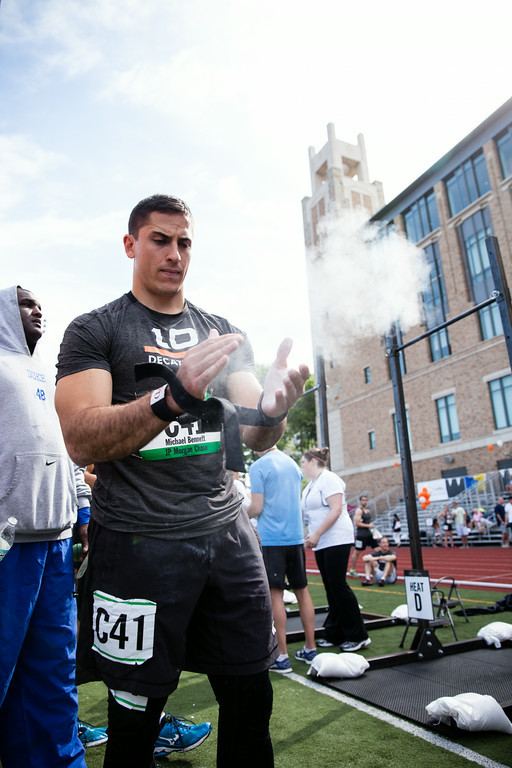UNBROKEN (installment 02.16)
March 25, 2016

Market: New York
Athlete: Michael Bennett (JP Morgan Private Bank)
I started competing in the Wall Street Decathlon two years ago. This will be my third competition and I hope that there will be many more. To borrow a line from a famous lyricist (with some modification): “Business and sports are so synonymous, we want to be them and they want to be us”. The Decathlon brings both worlds together seamlessly and the synergies are remarkable. Athletes and Wall Street have long been synonymous and make a good pair. The duo is improved when you add philanthropy to the mix (philanthropic inclination, by the way, has been common of the people I have been lucky to meet in this business).
When I think of my Decathlon experience, the singular moment that I remember most is the 400 meter run from my first competition. My sentiment could apply to any of the events but the 400m was first. It was the first time I had raced in a long time. I mean actually raced.
We live in the “rat race”, we are always competing. We compete against companies, co-workers, family, friends – we compete for business deals and we have bottom-lines where we can measure the results of our competition. But it’s been a long time since a lot of us have actually gotten to race; to pair the physical with the mental and put months of work on the line for what is (hopefully) less than a single minute of competition.
I remember the cadence from “on your mark” to the starting pistol moving a lot quicker than it had at my high school track meets – maybe I had just been out of the game for a while. I also remember that they had stuck me in lane 7 – lane 7 is the worst starting position (second only to lane 8, of course); you are what feels like miles ahead of the other runners at the start (the curve negates any perceived advantage) and you cannot see your competition. I started running and still didn’t see anyone for a while which I felt good about. In the last 100 meters, though, I saw them. With 20 meters left in the race my legs started locking up and right then and there I was reminded that there is a difference between training and “game day” that you cannot prepare for. Experience counts for something.
Beyond the other runners, the clock is also a competitor. We have competition and we have deadlines. The clock is not subjective, the clock doesn’t give the benefit of the doubt; there is no smoothing, no rounding, no grossing-up or down. The clock does not lie. That is the beauty and the terror of clock all at the same time. In year two I used the clock as a way to compete against myself from year one. This year I know there will be some new competitors but also that same old foe.
During that 400m run two years ago, for less than a minute nothing else mattered. This is the beauty of sport. The fleeting moment before you’re back to reality – the strange thing is that while it’s happening you want it to be over. It’s when you look back you realize the beauty of the clock – it’s an enemy and a friend. Add in the competition. Add in a four-hour day of 10 maximum efforts ahead of you. Then think about the money you raised and the money your fellow competitors raised. Think about how it will directly benefit children and the doctors, nurses and researchers that work for those children. Our bottom-lines and the races we run pale in comparison to the daily efforts of strength and courage from these folks.
The only way to get ready for the clock is to prepare – just like you do for your job. Just like the clock, the efforts of preparation do not lie and will be completely transparent at the end of the race. The clock is ticking. Hurry up.